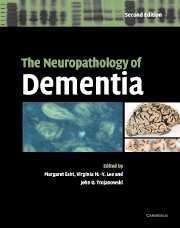Book contents
- Frontmatter
- Contents
- List of contributors
- List of abbreviations
- Preface to second edition
- 1 Definition, clinical features and neuroanatomical basis of dementia
- 2 Important anatomical landmarks in the brain in dementia
- 3 Practical approach to pathological diagnosis
- 4 Morphometric methods and dementia
- 5 Safety precautions in laboratories involved with dementia diagnosis and research
- 6 Molecular diagnosis of dementia
- 7 Neuropathology of the ageing brain
- 8 Neuroimaging Alzheimer's disease
- 9 Alzheimer's disease
- 10 Down's syndrome and Alzheimer's disease
- 11 Sporadic tauopathies: Pick's disease, corticobasal degeneration, progressive supranuclear palsy and argyrophilic grain disease
- 12 Hereditary tauopathies and idiopathic frontotemporal dementias
- 13 Vascular dementias
- 14 Familial and sporadic cerebral amyloid angiopathies associated with dementia and the BRI dementias
- 15 Parkinson's disease, dementia with Lewy bodies, multiple system atrophy and the spectrum of diseases with α-synuclein inclusions
- 16 Huntington's disease
- 17 Human prion diseases
- 18 Alcoholism and dementia
- 19 Hydrocephalus and dementia
- 20 Head injury and dementia
- 21 Infectious (and inflammatory) diseases causing dementia
- 22 Schizophrenia and its dementia
- 23 Other diseases that cause dementia
- 24 Transgenic mouse models of neurodegenerative disease
- Appendix: Dementia brain banks
- Index
13 - Vascular dementias
Published online by Cambridge University Press: 12 October 2009
- Frontmatter
- Contents
- List of contributors
- List of abbreviations
- Preface to second edition
- 1 Definition, clinical features and neuroanatomical basis of dementia
- 2 Important anatomical landmarks in the brain in dementia
- 3 Practical approach to pathological diagnosis
- 4 Morphometric methods and dementia
- 5 Safety precautions in laboratories involved with dementia diagnosis and research
- 6 Molecular diagnosis of dementia
- 7 Neuropathology of the ageing brain
- 8 Neuroimaging Alzheimer's disease
- 9 Alzheimer's disease
- 10 Down's syndrome and Alzheimer's disease
- 11 Sporadic tauopathies: Pick's disease, corticobasal degeneration, progressive supranuclear palsy and argyrophilic grain disease
- 12 Hereditary tauopathies and idiopathic frontotemporal dementias
- 13 Vascular dementias
- 14 Familial and sporadic cerebral amyloid angiopathies associated with dementia and the BRI dementias
- 15 Parkinson's disease, dementia with Lewy bodies, multiple system atrophy and the spectrum of diseases with α-synuclein inclusions
- 16 Huntington's disease
- 17 Human prion diseases
- 18 Alcoholism and dementia
- 19 Hydrocephalus and dementia
- 20 Head injury and dementia
- 21 Infectious (and inflammatory) diseases causing dementia
- 22 Schizophrenia and its dementia
- 23 Other diseases that cause dementia
- 24 Transgenic mouse models of neurodegenerative disease
- Appendix: Dementia brain banks
- Index
Summary
Introduction
One of the most controversial and difficult areas in the pathology of dementing disorders is the role of cerebrovascular disease in dementia. Most of the main problems in assessing the significance and pathophysiology of cerebrovascular disease in the aetiology of dementia can be discussed under one of the following four questions:
(i) How do we define cognitive impairment and dementia in the context of vascular disease?
(ii) What is the frequency of dementia in association with cerebrovascular disease?
(iii) What effects does cerebrovascular disease have on the nervous system and how does it produce cognitive impairment and dementia?
(iv) What are the neuropathological criteria for vascular cognitive impairment and dementia?
Historical overview
The history of dementing disorders, and specifically that of vascular dementia (VaD), has been profoundly and vividly covered by Roman (1999, 2002) and Mast et al. (1995). The most likely first description of post-apoplectic VaD was presented by Thomas Willis in the seventeenth century. On the basis of their clinicopathological studies at the turn of the nineteenth and twentieth century the two famous contemporary German neuropsychiatrists and pathologists, Alois Alzheimer and Otto Binswanger, distinguished VaD from what was, at the time very common, syphilitic dementia. The long-held fallacious view that the most frequent cause of senile dementia was arteriosclerosis (arteriosclerotic insanity) was due to Kraepelin's summary of the above-mentioned studies (1910), in which the progressive narrowing and obliteration of large cerebral arteries was thought to lead to diminished cerebral blood flow (CBF) and consequently neuronal death and dementia. The problem with many of the studies until the 1970s was that in those days in most cases the nature of the cognitive decline was not extensively investigated.
- Type
- Chapter
- Information
- The Neuropathology of Dementia , pp. 289 - 329Publisher: Cambridge University PressPrint publication year: 2004
- 3
- Cited by



